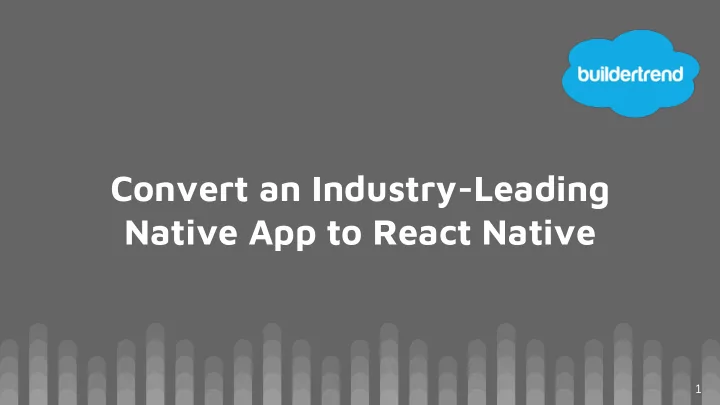

Convert an Industry-Leading Native App to React Native 1
sdmay19-02 Team Members: Victor Amupitan Francis San Filippo Kyle Nordstrom Lucas Kern Michielu Menning Walter Seymour Client: Buildertrend Jake Johnson Rich Kalasky Daric Teske Faculty Advisor: Mai Zheng 2
About Our Client Buildertrend provides web-based home builder software ● Has mobile applications for both android and iOS ● #1 Software for home builders and remodelers ● 3
Project Plan ● Problem Statement ● Market Research ● Conceptual sketch ● Risks and Mitigation ● Requirements ● Costs ● Constraints ● Milestones 4
Problem Statement Buildertrend currently has ● development teams for both iOS and Android Must develop, maintain, and test ● on both platforms React Native eliminates the need ● for development on two separate platforms 5
Market Research Researched Buildertrends current mobile applications so we ● can recreate it Were given user account to investigate design ● 6
Conceptual Sketch 7
Functional Requirements Users must be able to log in and out of their existing accounts ● Both iOS and Android platforms should look and feel ● consistent for the users Connect to Buildertrends servers and APIs ● Replicate project management functionality ● 8
Non-Functional Requirements Performance - The application must handle areas with slow ● network connections Usability - The mobile application should be user-friendly and ● responsive Maintainability - Code should be easy to understand for future ● developers 9
Constraints React Native Framework ● Functionality must be the same as Buildertrend’s current app ● Integration with pre-existing technology ● 10
Risks & Mitigation Relying on captured HTTP requests - mitigate ● Lacking Understanding of React Native Framework - avoid ● Relying on mobile phones - mitigate ● 11
Resource/Cost Estimate Open-source software: It’s free to use! ● Developers are all using Macs and have rented these from ● Iowa State Platform testing can be done with free virtual devices ● 12
Milestones & Schedule 13
System Design ● Functional Decomposition ● Detailed Design ● Hardware and Software platforms ● Test Plans ● Prototypes 14
Functional Decomposition 15
Detailed Design 16
Hardware & Software Platforms Hardware: Smart Phones ● React Native ● Jest and Enzyme ● Redux ● Gitlab, ESLint ● Android Studio/XCode: Simulation ● Yarn ● 17
Test Plan Continuous Integration (automated testing) ● Unit testing (component based) ○ Functional testing (component interactions) ○ Integration Testing ○ Connection to servers ■ Manual testing ● 18
Initial Prototype Our Application Existing BT Application 19 1 2 3 4
Conclusion 20
Project Status Finished Phase 1: Initial Prototype ● Architecture and skeleton of app ○ Began Phase 2: Structured Prototype ● Fill in the functionality of each component ○ 21
Task Responsibilities Frank - API Services Mich - Front End Dev ● ● Login/Logout Implements UI Components ○ ○ Integration with BT backend UI Styling ○ ○ Victor - Architect Lucas - Architect ● ● Architecture Implementation Designs architecture ○ ○ React Navigation React Navigation ○ ○ Redux Store Walter - Front End Dev ○ ● Kyle - Scribe/Meeting Facilitator Implements UI Components ● ○ Ambassador for Client UI Styling ○ ○ Arranges meetings ○ 22
Next Semester Plan Finish phase 2 ● Functional submenu component UIs ○ Complete navigation (Experiencing loading) ○ Begin phase 3 of our application ● Integration with BT backend ○ Finialized styling ○ Prepare for project transition ● 23
Thank You! 24
Questions? 25
Conceptual Sketch 26
Functional Decomposition 27
Gantt Chart Semester 1 28
Gantt Chart Semester 2 29
Detailed Design 30
Recommend
More recommend